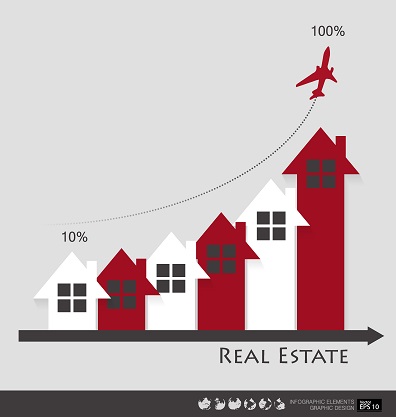How Top Real Estate Companies Leverage Technology to Soar New Heights
As the adage goes, “it is a wild, wild world out there,” and nothing exemplifies it more than real estate. Real estate business offers rich and lucrative returns, but the scene is often chaotic. The absence of uniform standards, vastly different regulations and compliance requirement across geographies, highly fickle and disparate consumer requirements, all pose big challenges. Real estate firms face several pain points in coming at a correct amount for acquiring properties, identifying the apt rent amount, collecting the rent, effective management of properties, tracking maintenance, identifying long-term lease strategies, fixing agent commission, managing data, and in just about all gamuts of operations.
Many real estate companies take the easy route of ad-hocism, but such methods deliver only short-term and temporary gains and come with the cost of long-term pain.
Technology now offers viable solutions. Intuitive web applications and solutions help real estate companies remain in control of the highly fluid environment they work in and meet customer demands in a proactive way.
Related post: How technology helps Real Estate Companies improve profits
Ready Made Apps
Several ready-to-deploy apps in both the Google Play Store and AppStore, used by several property managers:
- Zillow is a popular free app for property search, offering several robust search filters and value added features such as mortgage calculators, access to “hidden” inventory, property estimates, and more.
- AppFolio, a marketing app, allowing property dealers to post ads to their own website and a number of other websites easily, rather than update all the websites and portals one-by-one. Other handy functionalities on offer include the ability to screen residents for credit eviction and criminal antecedents, check up on payment history provided by Experian RentBureau, the FICO credit score, and more.
- Rent Tracker allows property managers to enter tenants, contractors, buildings and even multiple owners. Tenants make rent payments and receive auto-generated email receipts, taking a load of the property’ manager’s back. PayByGroup goes a step further and allow property managers to organize and collect money from multiple tenants, and manage multiple tenets seamlessly. DIY Landlord likewise allows property managers to organize and manage property by unit, lease and tenant information. Follow-up and collecting rent in a timely manner is a big challenge and sucks up time and resources.The ideal mobile option offers various payment options such as debit card and credit card payment gateway, e-checks, and money transfer option, enabling tenants and buyers to make payments conveniently, without having to take a break from their busy life to do so. Such apps effectively manage hurdles such as delayed payment, conflict in payment, NSF and tax payments, cheque bounce issues, and a lot more, saving precious time.
- ReachOut Suite, a property inspection app, makes the task of conducting property inspections very easy and improves the productivity of inspectors manifold.
- ZipRealty offers an intuitive HomeScan feature, where a user simply holds up her iPhone to discover the homes for sale or recently sold in the vicinity, with the option to delve into further details such as asking price and photos.
While such readymade apps offer a host of useful functions, these are generic in nature, and may not suit the specific needs of the firm. In any case, the shortcut of using these apps come at the cost of loose integration of data, and the accompanying loss of efficiency, productivity, and accuracy, as data is duplicated, re-entered, and moved from one system to another.
Apps of Leading Realtors
Successful real estate firms see through the inefficiencies and roadblocks posed by disparate and half-baked systems and have invested in deploying native apps and other systems, customized for the exact needs of their stakeholders. Stakeholder centric responsive apps, for employees, agents, residents, owners, vendors, and others, provide the right data in a timely manner and automate routine processes. Such apps are almost always part of a comprehensive system.
- Leading realtors such as Weichert have deployed innovative customer facing apps, offering a gamut of functions such as social selling, taking prospects on a virtual tour of the property, and knowledge sharing, besides basic functions such as scheduling site visits and fixing appointments. In the backend, such customer-initiated activities become the basis for effective lead management.
- Keller Williams’ customer facing app likewise offers several handy functionalities, including a GPS map of the property locations, a listing of nearby schools and other utilities in the vicinity, photo galleries, mortgage calculators, ability to engage with an agent, and more.
- The Corcoran Group’s app leverages Google maps to shows sales and rental listings and also helps users find shops, restaurants, and other services near their current location. Such an Uber-like app works wonders for customers seeking rentals and purchase of a property. An intuitive drill down feature, offering further details such as price, lease terms, and other details accelerate the process, and may even lead to prospects closing the deal immediately.
- Voyager, Yardi’s property management solutions packs in a comprehensive range of functionality, centered on an integrated database. The solution integrates the accounting system, builds a lease renewal workflow with the ability to renew contracts, follow-up leads, manage maintenance work orders, generate comprehensive reports, and much more.
- Rentmoji, the all-in-one property management app handles every phase of the real estate business, right from property acquisition, vendor and work order management to maintenance and rent collection. It utilizes a SMART methodology platform, mapping out each vertical by automating property syndication, lead harvesting, resident screening, document storage, maintenance workflow management, vendor management, accounting and more.
- Coldwell Banker’s redesigned app is exemplary of the changing customer preferences. Buyers and sellers can post listings, and also share notes, photos, and videos, in a storytelling mode. The app also enables seamless engagement with agents, and a host of other features.
The Rationale for an Integrated Real Estate Solution
Managing all functions, from investment decisions to procurement, and from leasing to property management, from a single integrated system enables greater flexibility with good control. The executive, can, for instance, view trends as it unfolds and make necessary changes to the business process, without leaving the app. She could react to the announcement of a new project in a locality, with an immediate decision to purchase plots in the area, and execute the decision by deploying their agents in the locality, and simultaneously go on a promotional blitzkrieg, all without leaving the app.
The importance of big data analytics can never be emphasized in any business, more so in real estate, where several trends are at play, and there is a need to pamper the customer. An integrated app facilitates deep analytics. Millennials have both the budget and the inclination for home ownership. However, they are also technology independent, and real estate businesses have no option but to reach out to them with customized services, on an informed basis.
An integrated suite also plays into the need for cost consciousness. Success in today’s highly competitive environment, topped up by a recessionary climate, no longer depends only on increasing sales, but also requires extracting maximum possible efficiency from the deployed resources. Technology helps firms generate maximum value for money.
A major pain point for real estate companies is keeping track of maintenance requests, and managing maintenance. An integrated mobile app keeps property managers informed of the status of their properties, with real-time up-to-date data delivered at any time of the day or night, wherever they are. Such an ideal app would open a ticket for each request, notify the persons responsible for executing the tasks, notify key stakeholders of the status, all in real time. Property managers could track the completed works vis-à-vis the ideal timelines, and take remedial actions if required.
Real estate firms would do themselves a favor by developing custom software with the required features, and flexible enough to scale up and down as required. The double benefits of productivity and efficiency improvements, with improved customer satisfaction, is well worth the investment.
Stay up to date on what's new

Recommended Posts

08 Jul 2023 B2B
AR, VR, and 3D Configurators for Real Estate
The implementation and development of immersive digital technologies such as Artificial Intelligence, Augmented Reality, Virtual Reality, Machine Learning, and 3D Configurators have drastically changed the way the world works. These……

08 Mar 2022 Real Estate
Reshaping Real Estate Operations with Fully Integrated End-to-end Solutions!
The property sector in the United States came to a crashing halt in March 2020, when the first wave of COVID-19 hit the nation. Mortgage rates dropped by 34%, affecting……

13 Dec 2021 Real Estate B2B
What’s In Store For Real Estate This 2024?
Across the globe, the real estate industry took a hard hit during the COVID-19 pandemic, which left millions jobless. The huge migration of construction workers affected thousands of construction projects.……

24 May 2019 Real Estate
How Predictive Analytics is Changing Commercial Real Estate
Adoption of Predictive Analytics The Commercial Real Estate (CRE) industry is growing. New business models and competition, extensive use of technology, and changing tenant and investor expectations are redefining the……
Featured Blogs
Stay up to date on
what's new


























































